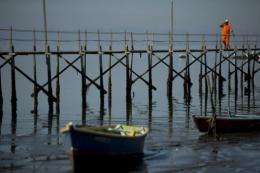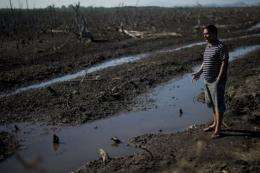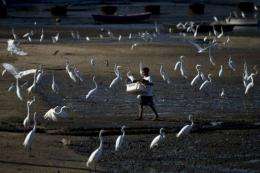Rio bay fisherfolk in deadly feud over oil complex

Fisherman Alexandre Anderson vows that despite six attempts on his life he will keep fighting against the oil project he believes is threatening fishing in Rio's polluted Guanabara Bay.
Anderson, president of the Men and Women of the Sea Association (Ahomar), has been under 24-hour police escort for the last two years.
The 41-year-old rides through the streets of Mage, 63 kilometers (40 miles) north of Rio, in the back seat of a military police patrol car, escorted by men armed with automatic weapons and shotguns.
The security measures are part of a federal protection program created after four top Ahomar officials were murdered, including two late last month.
The 3,000-member Ahomar launched its campaign five years ago to defend small-scale subsistence fishing in the bay.
It has denounced alleged crimes and rights violations committed during the construction of a major new refinery and processing plant, the Rio de Janeiro Petrochemical Complex (Comperj), owned by state energy giant Petrobras.
At one time, Guanabara Bay had healthy mangroves, sandy beaches and a rich ecosystem. Decades of urbanization and deforestation have taken their toll on waters now choked full of household garbage and sewage.
But it was the massive oil leak in 2000, which saw nearly one million liters of crude spew into the bay from an underwater Petrobras pipeline, that experts believe is most responsible for the contamination that ruined the bay.
In 2009, Ahomar activists used their fishing nets to block big ships from passing through the bay, a protest over the 80 percent drop in their catches since the disastrous oil spill.
That, Anderson says, is when the threats began.
He blames police-linked groups tied to Petrobras contractors for the two murders last month, and the earlier ones in 2009 and 2010.

"Petrobras is opposed to our struggle, of that I am sure," Anderson said. "Ahomar is the last focus of resistance that remains in Guanabara Bay." He has pressed for an investigation into the killings.
Petrobras told AFP that it knew nothing about the killings, "repudiates all threats against the fishermen," and gave assurances that all its works are undertaken only after "a rigorous study of impacts" on the environment and the area population.
"Petrobras is a socially and environmentally responsible company and it demands the same from its suppliers," it added.
The state-owned company was fined $28 million for the 338,000-gallon leak and has spent more than $200 million over the past decade on environmental and social projects in the area.
Ahomar leaders Joao Luiz Tellez Penetra and Almir Nogueira do Amorim disappeared June 22 after returning from fishing. Their bodies were found two days later with indications they had been executed: their hands and feet were tied in the fetal position and there was evidence of suffocation. Almir's body was found tied to his boat.
But Anderson said the killings will not deter him.

"After the attacks, the threats, the smell of gunpowder, we have no fear. Our struggle is for the benefit of this community, the fisherfolk, but we know that it could lead to my death," Anderson told AFP.
Authorities offered on Tuesday to move him and his family to another city outside Rio de Janeiro state.
"We said no, this is not the time. I cannot abandon my colleagues," Anderson said.
At the same time, he complained that the authorities had failed to adequately prepare and equip his escorts.
Several rights groups, including Amnesty International, have urged Brazilian authorities to beef up security for Anderson and to give protection to his wife, Daize Menezes, who also received death threats.
The last time Anderson went out fishing was in August 2010.
"They took away my right to fish. They took away my freedom," he said, lamenting the fact that authorities will not give him an escort to go fishing.
With no work to support his family, Anderson lives off donations from friends, relatives, shopkeepers, a few non-governmental organizations and a law firm.
Meanwhile, thousands of other fisherman have given up on plying their trade in the bay.
"Until the 1990's, there were about 23,000 families around the bay. Today there are only 6,000. Fisherfolk are selling their boats, quitting fishing and switching to other activities like trade," complained Anderson.
"Our children don't want to be fishermen, and we would like them to be. Fishing is dying in Guanabara."
Ahomar plans to hold a general assembly to plot new actions against the petrochemical firms in the coming days.
(c) 2012 AFP




















